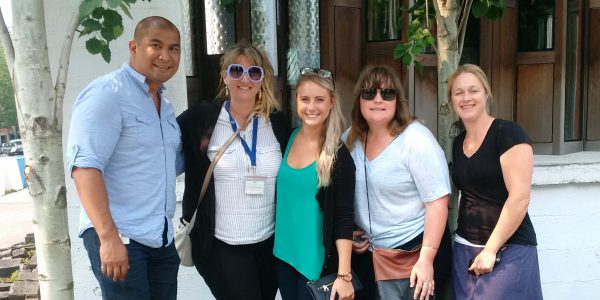New HOPE Team in DTES is a First for B.C.
A new Health Outreach and Peer Empowerment (HOPE) team within Mental Health will work with Mental Health and Substance Use (MHSU) Supported Housing clients to determine their cleaning and laundry needs, as well as incorporate recovery oriented coaching and household life skills so they can become more independent. The new team launched on July 31st.
VCH News sat down with Bonnie Wilson, Operations Director, Inner-City Eastside and co-Program Lead for Mental Health and Substance Use to find out more about the program.
VCH News: Is this a new model of care?
Bonnie: Yes. This is a new approach to client care and is the first program of its kind in BC. The focus will be on more than cleaning and laundry – it’s about rehabilitation and building on the skills of the client. It will cover all aspects of health and wellness (physical, psychological, social, emotional, spiritual) with an emphasis on the continuum of care and community integration, as well as the flow of service that is client centered and flexible.
VCH News: How many clients are there?
Bonnie: Approximately 300.
VCH News: How did these clients get cleaning and laundry services before this new model?
Bonnie: MHSU clients who have struggled to complete household management tasks, such as cleaning and laundry, have been provided these services through traditional Home Support. However, these services are outside the scope of VCH Home Support, which is more geared towards clients with physical care needs.
VCH News: Why do we need to provide this type of support?
Bonnie: Without support for cleaning and laundry tasks, many MHSU clients are at risk of eviction due to hoarding or lack of cleanliness. This can then lead to withdrawal of in-home support services, denial of access to social services outside the home, hospitalization due to exacerbation of symptoms of mental illness, and delayed discharge home from acute services. It has quite the domino effect.
VCH News: Where is the funding coming from for the new HOPE team and the cleaning services?
Bonnie: The funding that supported the Home Support services for MHSU housing clients was reallocated to the new program.
VCH News: Who is the HOPE team?
Bonnie: The HOPE team will consist of five case managers who will each supervise eight MHSU Peers. Having MHSU peers will be good for our clients because the peers will have a better understanding of what they’re going through. The program is also good for our peers who will develop skills through this role. The peers will go through a four week peer leadership mentor training program with Open Door Group-Thrive Program.
VCH News: Who will provide the cleaning service?
Bonnie: We issued an RFP in December of last year. Two providers have been contracted out of this proposal call:
- Clean Start (who will provide intensive, full support to clients in need); and
- Always Best Care (who will provide mild to moderate support as needed for clients)
VCH News: Is this a temporary program?
Bonnie: The goal is to help clients develop skills so they are able to live independently and no longer need our services on a long-term basis. Once clients hone their skills, our staff will assist them by connecting them to other rehab services that may further increase their health and wellness.
For more information on the HOPE team, please contact Neil Arao, Manager, MHSU Services at neil.arao@vch.ca or call 604-216-8741.

